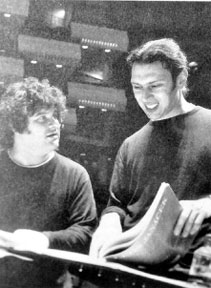When Jurowski took on Beethoven's quintet in E Flat Major
by Gwen Herat at the LPO, Southbank
We all have our favourite composer and scores. Sitting down at the
Royal Festival Hall and watching Vladimir Jurowski conduct Beethoven's
Quintet in E Flat with the London Philharmonic Orchestra was a dream
from which I did not want to wake up. Sometimes music lovers are so
smitten, they hear the scores rising from across the ocean or the wind
gently sweeping over trees.
Music has played a very important part in my life, for better or
worse. In my youth I have gone through a wide assortment of musical
subjects from which the impacts were both rewarding and frustrating but
its spirit has kept the fire burning within me that takes me to the
Royal Festival Hall at least once a year.
Ludwig van Beethoven's E Flat Major Quintet was written for the piano
and scored in 1796 and first performed at a concert by the violinist.
Schuppanzigh in 1797.
The Quintet formed a part of Beethoven program chosen by the
violinist for his farewell concert in Vienna.
The E Flat Major Quintet was buried in my soul the moment my teacher
put me at the piano to play it.
 |
|
Vladimir Jurowski with
a member of the London Philharmonic Orchestra |
The first movement opens with a slow introduction where the piano
leads into the Allegro. All wind instruments follow one after another
with the piano offering a decorated part of the version on the principal
theme, after which the piano is allowed into a thematic, haunting mood.
My teacher (Glenice Range) had so much patience to split the score in
order for me to grasp its movement and placed the pieces together so
that it was not a burden for me to follow but still I faulter to absorb
the brilliance Beethoven fed into it.
Major performance
But it looked so much an easy score for Vladimir Jurowski to conduct.
It simply melted at his wielding and flowed on to the London
Philharmonic Orchestra as they orchestrated the score.
I recall at one of his workshops, he said of Beethoven which was the
subject of his first major performance for the season at the London
Festival.
He said, 'Is there still something we do not know about him? Doesn't
his music already receive enough loving attention all over the world?
Jurowski confessed that he really did not know the creator of arguably
the most popular melodies ever written. Or to put in differently, 'The
composer Beethoven often disappears in our perception behind the myth of
Beethoven.'
Jurowski keeps exploring the boundaries of symphonic music, often
dwelling into scores that are seldom found in the sheets of major
recitals.
He is so dedicated that he takes it upon himself to popularise and
surface the lesser known scores of those Masters. His program contrasts
the heady power of Beethoven among others.
The classical ethos of beautiful sonatas balanced against the
transcendent music of others, come easy to him. Jurowski feels the
emotionally gripping Quintet as a visionary and valedictory composition,
one of the facts that keeps me drawing closer to the wondrous
conductor.
Lyrical impulse
The unaffected gusto and the powerful lyrical impulse in composers,
have often drawn me closer to their work rather than the genius found
within them. Jurowski knows how to translate them precisely the way I
look at them. His musical integrity, power of conviction along with a
haunting imagination, often contrasts with others.
Some may not feel it in their enthusiasm for his music alone but I
can pick up the passionate impulse each time he brings down the baton.
My attitude to his music is much different to many because I try my best
to attend his workshop before a recital. Thanks to my father for turning
me into the sensitive creature I am.
I was more inquisitive than surprised when Stravinsky played that
night. Stravinsky's ebullient Capriccio for the piano and orchestra
shines gloriously, especially played solo by pianist, Emmanuel Ax.
Stravinsky has never been so much a favourite of mine but I am fairly
updated on his ballet scores some of which I came in contact with during
my training era. If I am not wrong, may be it was that Stravinsky who
wrote for more ballet than anyone else; even more than Tchaikovsky. The
Firebird, Pethrushka, The Rite of Spring, Le Noces and Pulcinella some
of which I can pick at random as full-length and several other excerpts.
How mystical it is to listen to Jurowski's iconic handling of the
Composers. His art as always, is so kind to the ears of listeners. He
shapes and gestures to offer a plethora of seductive music, recalling
nostalgia and the boundless joy of fulfilment.
|

